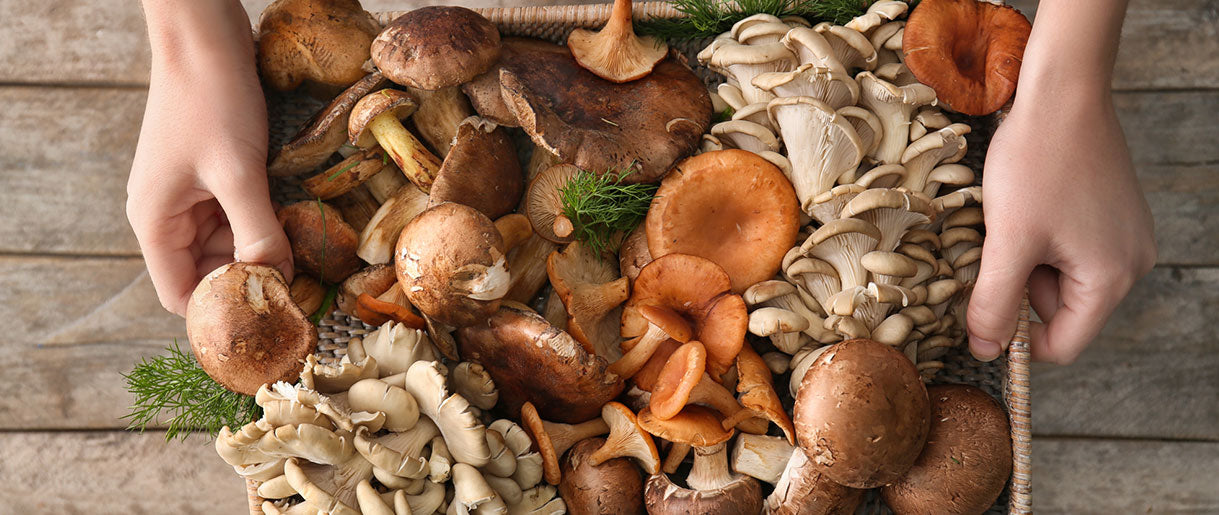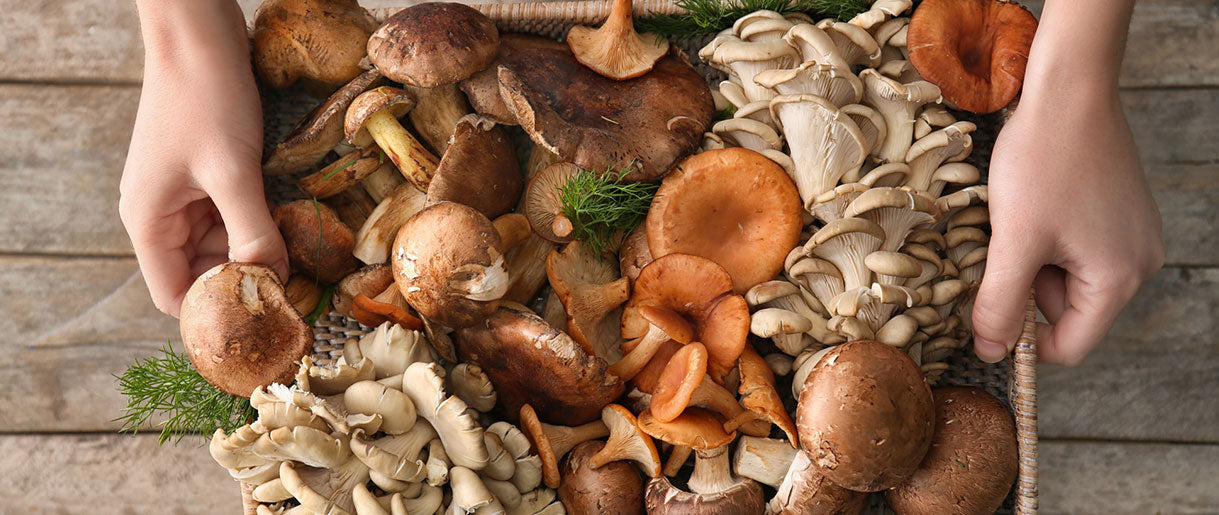Mushrooms have been recognized in various cultures and modern scientific studies for their potential health benefits, including kidney health. Some types of mushrooms, such as Reishi and Cordyceps, are rich in antioxidants and anti-inflammatory compounds that may aid in preventing kidney damage. They are believed to support overall kidney function and could help manage kidney-related issues.
Incorporating mushrooms into your diet may offer some kidney health benefits. Still, it's always essential to consult a healthcare professional before starting any new dietary regimen, particularly if you have pre-existing kidney conditions.
This article delves into the fascinating world of fungi, focusing mainly on the kinds known for their positive impact on kidney health. We aim to not only enlighten you about the beneficial properties of these mushrooms but also provide practical advice on how to incorporate them into your daily diet. You'll also understand why certain mushrooms stand out in supporting kidney function, helping you make more informed dietary choices.
Understanding Kidney Health: An Essential Guide

The Role of Kidneys: More than Just Filtration
While small, your kidneys play a vital role in maintaining overall health. Beyond filtration, kidneys control blood pressure, maintain electrolyte balance, produce red blood cells, and help to strengthen your immune system. Supporting kidney health is essential, not just for these organs but also for your whole body's wellness.
Common Kidney Problems: Recognizing the Signs
In today's society, kidney disease is a common health issue affecting millions worldwide. Chronic kidney disease, a long-term condition where the kidneys don't work as well as they should, is particularly prevalent. Symptoms can be subtle, but early detection can prevent progression to kidney failure, which would require dialysis or a transplant.
Kidney stones, a painful condition caused by hard deposits forming in the kidneys, are also common. The sizes of kidney stones vary, ranging from as small as a grain of sand to as large as a pearl.
Polycystic kidney disease, another example, is a genetic disorder causing numerous cysts to grow in the kidneys, which can lead to chronic renal failure over time.
The Importance of Maintaining Kidney Health
Kidney health is critical to your body's overall functioning. Kidney damage can occur due to other chronic diseases like diabetes or hypertension. Therefore, maintaining a lifestyle that supports kidney health is vital for kidney patients and anyone who wishes to prevent kidney problems.
The immune system plays a significant role in kidney health. Infection can often lead to acute kidney issues or exacerbate chronic kidney disease. Hence, having a robust immune system can help prevent kidney damage and infection.
Renal function, referring to how well the kidneys work, can decline with age or due to various health conditions. Strategies that support kidney health are essential to slow this decline and maintain optimal kidney function.
The Urgency of Addressing Kidney Health
Understanding and addressing kidney health becomes even more urgent, considering the high prevalence of kidney failure. It's a severe condition resulting from cumulative kidney damage over time, where the kidneys can no longer perform their essential functions. By addressing kidney problems early and implementing strategies to support kidney health, we can prevent or slow the progression of kidney failure.
Mushrooms: An Overview of Types and Health Benefits

Diverse Varieties: An Introduction to Different Types of Mushrooms
The world of mushrooms is astonishingly diverse, offering many types, each with unique properties. In traditional Chinese medicine, mushrooms have long been used for their healing attributes. Among the wide range of varieties, medicinal mushrooms such as Reishi, Cordyceps, Shiitake, and the familiar White Button all find their place.
Power-Packed Fungi: The Health Benefits of Mushrooms
Mushrooms are a versatile culinary ingredient and a powerhouse of nutrients. They are rich in dietary fibers, vitamins, and minerals, making them a healthy addition to any diet.They also offer unique compounds like Beta Glucan, known for its immune-enhancing effects.
From Inflammation to Nutrition: Why Mushrooms Matter
A significant aspect of the health benefits of mushrooms lies in their anti-inflammatory properties. Inflammation is a critical component of many chronic diseases, and the dietary fibers in mushrooms can help regulate it. This makes mushrooms a beneficial ingredient in diets aimed at managing conditions characterized by inflammation.
Moreover, mushrooms are a rich source of vitamins and minerals. Mushrooms provide vitamin D, B vitamins, selenium, and potassium. In traditional Chinese medicine, medicinal mushrooms are often used for their ability to strengthen the body and support overall health.
The Role of Mushrooms in Kidney Health: Uncovering the Evidence

Examining the Evidence: Review of Research Studies on Mushrooms and Kidney Health
The phrase "mushrooms for kidneys" has been trending in nutritional circles, fueled by promising research into the benefits of these fungi. One question that arises is: are mushrooms good for kidneys? Based on scientific studies, the answer is yes, mushrooms can be good for kidneys in several ways.
Studies conducted on cordyceps militaris and sinensis have shown that these mushrooms can positively impact kidney health. For instance, a study conducted in 2014(1) on Cordyceps Sinensis, a type of medicinal mushroom, showed potential in managing kidney disease by improving renal function and lowering serum creatinine, an important indicator of kidney health.
Another study conducted in 2019(2) on cordyceps militaris showed that the mushroom could aid in managing Chronic Kidney Disease. It's worth noting that while these results are promising, always seek medical attention for any symptoms or concerns related to renal disease.
Properties of Mushrooms Beneficial to Kidneys
Mushrooms, good for kidneys due to their unique properties, contain vital nutrients that can contribute to kidney health. For instance, they contain antioxidants, protecting the kidneys (and other organs) from oxidative damage.
Mushrooms improve blood pressure, helping maintain healthy levels. High blood pressure can damage small blood vessels in the kidneys, hindering their function. By helping maintain a balanced diet and normal blood pressure, mushrooms can support kidney health and the overall well-being of the human body.
Some mushrooms, like Cordyceps Sinensis, are known as "kidney tonics" in traditional medicine. They're thought to have properties that support the health and function of the kidneys, particularly by improving blood flow. This could be especially beneficial for individuals with high blood pressure, a common contributor to kidney disease.
The Comprehensive Role of Mushrooms
The question, "Are mushrooms good for kidneys?" takes on a broader perspective when we understand that kidneys are not isolated from other organs. The health of our kidneys impacts our cardiovascular health and vice versa. Mushrooms support the health of our blood vessels and provide essential amino acids, all of which are crucial for the well-being of our kidneys and overall health.
Best Mushrooms for Kidney Health: A Guide to Fungi and Wellness

Healing Fungi: Specific Mushrooms Known for Improving Kidney Health
If you're considering incorporating "mushrooms for kidneys" into your diet, several specific types are recognized for their potential kidney health benefits. These include Reishi, Cordyceps, and Lion's Mane, all of which have been utilized in traditional medicinal practices for their healing properties.
Diving Deeper: Unpacking the Properties and Health Benefits of Each Mushroom Type
Reishi
Often referred to as a kidney tonic, Reishi mushrooms have been associated with improved kidney function and the health of blood vessels. The Reishi mushroom benefits for kidneys include helping prevent kidney stones, a common issue affecting kidney health.
Reishi has been found to reduce proteinuria and nephrosis by making the kidneys less permeable and improving their capacity to filter toxins. But what does this mean?
Proteinuria, or an abnormally high protein level in the urine, is a complication that can be brought on by both diabetes and high blood pressure. In addition, swelling of the hands, feet, belly, and face may result from this due to the impaired capacity of the body to control fluid balance.
Reishi treated 14 patients in a human clinical trial(3) with persistent nephrotic proteinuria. In this study, Reishi reduced endothelial cell cytotoxicity, restored immune circulatory balance, and effectively reduced proteinuria.
In an in-depth study(4) of Reishi and the kidneys, renal ischemia—a lack of blood in the kidneys typically brought on by a blood vessel obstruction—was tracked over time. Reishi once more assisted in preventing kidney damage by reducing mitochondrial cell death and oxidative stress.
Cordyceps
Cordyceps mushrooms have been studied for their potential to protect against kidney disease. They are believed to improve the function of blood vessels, contributing to overall kidney health. Our detailed guide on the benefits of cordyceps for kidney health takes a deeper look at the benefits offered by this unique mushroom.
The bioactive compounds in Cordyceps sinensis(5) have been found to have several effects on the therapy of Diabetic kidney disease, including anti-hyperglycemia and anti-inflammatory and antioxidant actions.
Lion's Mane
Lion's Mane is another type of mushroom known for its numerous health benefits, including potential kidney benefits. While further studies are needed to understand its full impact on kidney health, initial research, and traditional usage suggest it may have protective effects on the kidneys.
In a 2017 study(6), Lion's Mane had the reno-protective effect of reducing the aberrant rise in blood urea nitrogen (BUN) and creatinine (CRE) levels. The mushroom extract also reduced the pathological damage to the kidney.
How to Incorporate Mushrooms into Your Diet: A Practical Guide

Selecting and Preparing Mushrooms: Tips for the Uninitiated
Choosing the correct mushrooms and preparing them correctly is the first step in incorporating mushrooms into your diet for kidney health. Here are some tips:
- Choose firm, fresh mushrooms, not slimy or wrinkled.
- Store mushrooms in a paper bag inside the refrigerator to keep them fresh longer.
- Clean mushrooms by gently wiping them with a damp cloth or a soft brush to remove dirt or debris. Avoid washing them under running water as they can absorb too much moisture.
- If you're using dried mushrooms, remember to rehydrate them in hot water before cooking. The soaking water can also be used as a flavorful broth in cooking.
Mushroom Recipes for Kidney Health: Simple and Delicious Ideas
Incorporating mushrooms into your diet can be as simple as adding them to your favorite dishes. Here are a few recipes that are not only delicious but also beneficial for kidney health:
- Mushroom Stir-Fry: Saute your favorite mushrooms with garlic, onions, and vegetables. Add a dash of low-sodium soy sauce for flavor.
- Reishi Mushroom Tea: Steep dried or powdered Reishi mushrooms in hot water for a soothing, health-boosting Reishi mushroom tea beverage.
- Grilled Portobello Burgers: Swap your regular beef patty with a grilled Portobello mushroom for a tasty, kidney-friendly burger.
- Supplements: If these mushrooms are not readily available in your area, consider supplements. They are often available in capsule or powder form.
Precautions and Potential Side Effects: What to Consider
While incorporating mushrooms into your diet for their potential kidney health benefits, it's essential to be aware of mushroom supplements' possible side effects or precautions.
Some individuals may have allergies or sensitivities to certain types of mushrooms. If you're introducing a new type of mushroom into your diet, start with small amounts to see how your body reacts.
While generally safe, some medicinal mushrooms can interact with certain medications or medical conditions. Always consult a healthcare professional before starting any new dietary regimen, particularly if you're taking medication or managing a health condition.
Other Lifestyle Habits for Kidney Health: More Than Just Diet

Hydrate for Health: The Essential Role of Water
Hydration plays a critical role in supporting kidney health. Our kidneys need a sufficient amount of water to function correctly. Drinking fluids helps the kidneys clear sodium, urea, and other toxins from the body, maintaining kidney health.
Get Moving: The Connection Between Exercise and Kidney Health
Regular physical activity isn't just good for your heart but also for your kidneys. Exercise helps regulate blood pressure and aids in maintaining a healthy weight, which is essential for kidney health. Whether it's a brisk walk, a swim, or a bike ride, finding a form of exercise you enjoy can contribute to keeping your kidneys in good shape.
Eat Well, Live Well: Balanced Diet Recommendations
While we've discussed the potential benefits of mushrooms for kidneys, it's important to remember that a well-rounded, balanced diet is crucial for overall kidney health. This should include a variety of fruits, vegetables, lean proteins, and whole grains. Try to limit your intake of processed foods, which are often high in sodium and phosphorus, elements that can strain the kidneys when consumed in excess.
Regular Check-ups: Staying Ahead of the Game
Regular medical check-ups are essential in maintaining kidney health, particularly for individuals with risk factors for kidney disease. Regular screenings can help detect potential issues early, improving the effectiveness of any necessary interventions. Remember, prevention is always better than cure.
Mushrooms For Kidneys
FAQs About Mushrooms for Kidneys
Are There Any Specific Types Of Mushrooms That Individuals With Kidney Disease Should Avoid?
Certain types of mushrooms might not be suitable for individuals with kidney disease, especially if they have dietary restrictions. For example, Chaga mushrooms are high in oxalates, contributing to kidney stones' formation.
Therefore, consuming Chaga mushrooms might not be advisable for individuals with kidney disease, particularly those prone to kidney stones. Moreover, wild mushrooms that aren't identified correctly can be poisonous and harmful to everyone, not just those with kidney disease.
Can Individuals Undergoing Dialysis Include Mushrooms In Their Diet?
Individuals undergoing dialysis can generally include mushrooms in their diet but with some considerations. Dietary restrictions for people on dialysis often include limitations on potassium, phosphorus, and sodium—all nutrients present in mushrooms.
However, some types of mushrooms, especially when consumed in moderation, may still fit into a dialysis-friendly diet. For instance, white button mushrooms are often considered a good choice because they are lower in potassium than other varieties.
It's also important to remember that preparing mushrooms can influence their nutrient content. For example, leaching or boiling mushrooms before eating can help reduce their potassium content.
It's crucial for individuals undergoing dialysis to work closely with their healthcare provider or dietitian to create a personalized meal plan that takes into account their specific dietary needs and restrictions. This is particularly important when considering including foods like mushrooms or other dietary supplements.
Are There Any Known Interactions Between Medicinal Mushrooms And Common Medications For Kidney Disease?
While many medicinal mushrooms are generally considered safe for consumption, there is the potential for interactions with certain medications, including those used to treat kidney disease. For example, some medicinal mushrooms may impact the immune system, which could potentially interact with immunosuppressant drugs often prescribed to patients with certain types of kidney disease.
Additionally, some mushrooms could theoretically interact with antihypertensive medications (drugs used to lower blood pressure), as they may also have blood pressure-lowering effects. It's also important to note that while some mushrooms are known to have anti-inflammatory effects, combining these with anti-inflammatory medications could potentially enhance their effects and risk of side effects.
Given these potential interactions, it's essential for individuals taking medication for kidney disease, or any other medical condition, to consult with their healthcare provider before starting any new supplement regimen, including medicinal mushrooms. The healthcare provider can provide guidance based on the individual's specific circumstances and needs.
Key Takeaways
Various types of mushrooms, such as Reishi, Cordyceps, and Lion's Mane, possess properties beneficial to kidneys, such as supporting the immune system, potentially reducing inflammation, and providing essential nutrients. Research indicates that these fungi can positively impact kidney health, from potentially managing kidney disease symptoms to possibly improving overall renal function.
However, as we've stressed throughout this article, incorporating mushrooms for kidney health should be part of an overall balanced diet and a healthy lifestyle. This includes proper hydration, regular exercise, and regular medical check-ups. And, of course, any changes to your diet, particularly for individuals with kidney disease or undergoing dialysis, should be made in consultation with a healthcare provider.
Do you have any experiences with mushrooms and kidney health you'd like to share? Any favorite mushroom recipes or preparation tips? We invite you to join the conversation. Please leave a comment below — we'd love to hear from you!
References
- Cordyceps sinensis (a traditional Chinese medicine) for treating chronic kidney disease, (1)https://pubmed.ncbi.nlm.nih.gov/25519252/
- Cordyceps militaris Improves Chronic Kidney Disease by Affecting TLR4/NF-κB Redox Signaling Pathway, (2)https://www.ncbi.nlm.nih.gov/pmc/articles/PMC6462325/
- Ganoderma lucidum suppresses endothelial cell cytotoxicity and proteinuria in persistent proteinuric focal segmental glomerulosclerosis (FSGS) nephrosis, (3)https://pubmed.ncbi.nlm.nih.gov/15567896/
- Ganoderma lucidum polysaccharide peptide prevents renal ischemia reperfusion injury via counteracting oxidative stress, (4)https://pubmed.ncbi.nlm.nih.gov/26603550/
- Mechanism of Cordyceps sinensis and its Extracts in the Treatment of Diabetic Kidney Disease: A Review, (5)https://pubmed.ncbi.nlm.nih.gov/35645822/
- Antihyperglycaemic and organic protective effects on pancreas, liver and kidney by polysaccharides from Hericium erinaceus SG-02 in streptozotocin-induced diabetic mice, (6)https://www.ncbi.nlm.nih.gov/pmc/articles/PMC5589823/










Let Us Know Your Comments